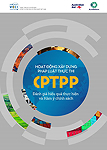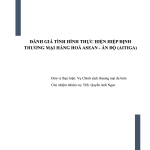Total number of posts 50.
 Time: 2021
Time: 2021
By: Center for WTO and International Trade - VCCI
As the first high-standard, new-generation Free Trade Agreement (FTA) that Vietnam has ever joined, The Comprehensive and Progressive Agreement for Trans-Pacific Partnership (CPTPP) has a direct impact on many domestic legal institutions of Vietnam. Therefore, unlike many previous FTAs, the activities of amending, supplementing and developing new domestic legal regulations to ensure compatibility with commitments is a top important task in the implementation of this Agreement.
In fact, it can be said that the CPTPP is the first agreement after the WTO that requires Vietnam to carry out law-making activities to implement such wide-ranging commitments. A significant part of law-making activities has been implemented in the period 2019-2020, with new, revised/supplemented documents issued in many areas, at different legal levels.
It is very important to summarize the implementation process of law-making activities to implement the CPTPP that has been implemented, to evaluate the successes and shortcomings, and to identify the related causes. On the one hand, this is the basis for Vietnam to draw direct lessons for the next CPTPP implementation phase. On the other hand, the policy implications from this can be useful suggestions for law-making activities to implement new-generation, high-standard FTAs in the coming time, especially the EVFTA, the UKVFTA.
In order to give a full picture of law-making activities to implement the CPTPP in the period of 2019-2021, thereby summarizing the achieved results, existing issues and policy implications for the Government and competent agencies to continue effectively implementing this work for both the CPTPP and other new-generation FTAs in the coming time, the Vietnam Chamber of Commerce and Industry (VCCI) (Center for WTO and International Trade) performed Research report “Implementing the CPTPP from a law-making perspective - Review of current results and policy implications for the future”.
The report is compiled on the basis of activities (i) Synthesizing law-making plans to implement the CPTPP of competent authorities (National Assembly, Government, Ministries); (ii) Reviewing in detail the drafting process, content, and actual effectiveness of legal documents to implement CPTPP commitments that have been issued or are being drafted in the period of 2019-2021; (iii) Analyzing and comparing the requirements of the commitments with the provisions of "internalizing" the commitments in these documents; and (iv) Interviewing and exchanging with a number of competent authorities in the development and implementation of these documents and a number of business associations that are directly affected by the regulations to implement CPTPP commitments. Methods of desk research, theoretical description, legal analysis and comparison, face-to-face interviews and/or expert commentary, synthesis and analysis of practice were used to compile this Report.
The research team would like to thank Senior Economist Pham Chi Lan - Former Vice President of VCCI, Lawyer Tran Huu Huynh - Former Head of VCCI’s Legal Department, Former President of Vietnam International Arbitration Center, Dr. Nguyen Van Cuong - Director of the Institute of Legal Sciences, Ministry of Justice for important comments on this Report. Sincere thanks to experts from the Ministry of Industry and Trade, the Ministry of Health, the Ministry of Labor, Invalids and Social Affairs, the Vietnam Association of Seafood Exporters and Producers, the Vietnam Textile and Apparel Association, Vietnam Leather, Footwear and Handbag Association for practical information that is very meaningful for the compilation of the Report.
The Vietnam Chamber of Commerce and Industry would like to thank for the support of the Australia supports Vietnam's economic reform program (Aus4Reform) in researching, compiling this Report./
The Report (in Vietnamese) is attached below:















